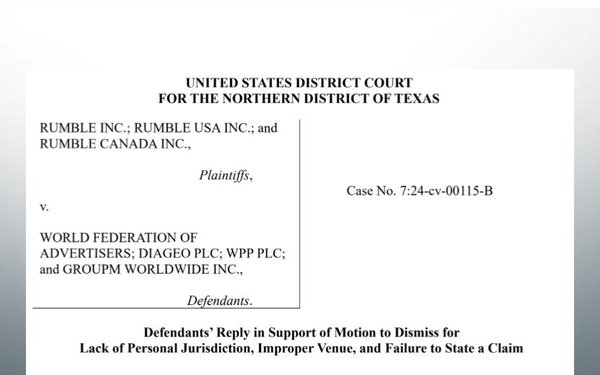
The World Federation of Advertisers,
spirits marketer Diageo, WPP and its subsidary WPP Media are pressing a federal judge to throw out a lawsuit by right-wing video platform Rumble over an alleged ad boycott.
They argue both that courts in Texas don't have jurisdiction over the dispute, and that Rumble failed to allege the kinds of facts that could establish a violation of antitrust
law.
Rumble's complaint "includes no allegations that any defendant did anything in Texas related to Rumble’s claims," the World Federation of Advertisers and others
argue in papers filed Tuesday with U.S. District Court Judge Jane Boyle in Wichita Falls, Texas.
The complaint also "fails to allege facts plausibly showing an agreement ... to
boycott Rumble," they add.
advertisement
advertisement
Their new court papers come in a battle that began last August, when Rumble sued the World Federation of Advertisers, WPP, GroupM (now WPP Media) and
Diageo for allegedly violating antitrust law by scheming to deprive the video platform of ad revenue. Rumble brought the case the same day Elon Musk's X Corp. sued the World Federation of Advertisers, its now defunct brand safety initiative Global Alliance for Responsible Media (GARM),
and others over an alleged advertiser boycott.
Both suits came soon after the Republican-led House Judiciary Committee accused GARM of coordinating action by corporations, ad
agencies and other industry groups in order to “demonetize platforms, podcasts, news outlets, and other content deemed disfavored by GARM and its members.”
Rumble
alleged that the defendants agreed to avoid placing ads on platforms that don't adopt its “one-size-fits-all brand safety standards.”
The video platform claimed it
attracted new users and content creators between 2020 and 2023, but didn't see a growth in ad revenue “commensurate to its growth in user popularity.”
Earlier this
year, the World Federation of Advertisers and others urged Boyle to dismiss the complaint for several reasons. Among other arguments, they said the factual allegations in the
complaint, even if proven true, would only show that the companies decided separately to refrain from advertising on Rumble.
They noted that Rumble -- which was founded in
2013, seven years before GARM issued a brand safety framework -- failed to allege that Diageo ever advertised on the platform or that GroupM ever facilitated advertising on it.
They also said the brand safety agreement -- which they submitted to the judge in an appendix -- “does not identify Rumble (or any other platform) as inappropriate for
advertising or any brand-safety measures as being required.”
They elaborated that framework “merely identifies content that is inappropriate for advertising support
(like child pornography, illegal activity, terrorism, etc.),” and that advertisers are free to ignore the framework.
The World Federation of Advertisers and others also
said the lawsuit didn't belong in Texas, arguing that none of the parties to the lawsuit are based in that state. Rumble is based in Toronto and its U.S. division is based in Florida.
Rumble countered in papers filed in April that the alleged boycott affected business in Texas.
The company also argued that GARM's own public statements "make
clear that the standards were mandatory for any platform that sought to receive advertising revenue from GARM members and that GARM members were required to adhere to the standards whenever they
purchased advertising inventory.”
The World Federation of Advertisers, WPP and Diageo are now asking Boyle to reject Rumble's argument. They reiterate in their new papers
the argument that Rumble's complaint doesn't include the kinds of allegations that would establish collusion.
"At base, Rumble is left with nothing more than the claim that
defendants’ participation in GARM is enough to allege an agreement," the defendants write.
They add that the 5th Circuit Court of Appeals -- which covers Texas -- ruled
in a 1988 case that a trade association "is not by its nature a ‘walking conspiracy.'"
The defendants also say Rumble's assertion that an alleged agreement affected
business in Texas "is both conclusory and irrelevant" to the key jurisdictional issue -- whether they transacted business in the state.
They add that WPP Media is the only
defendant that had clients based in Texas, and argue that an agency doesn't transact business in a state merely because some of its clients are in that state.
Boyle hasn't yet
indicated when she will issue a decision.